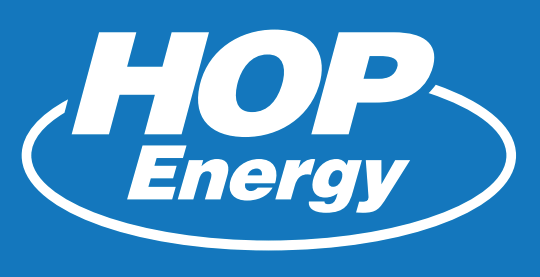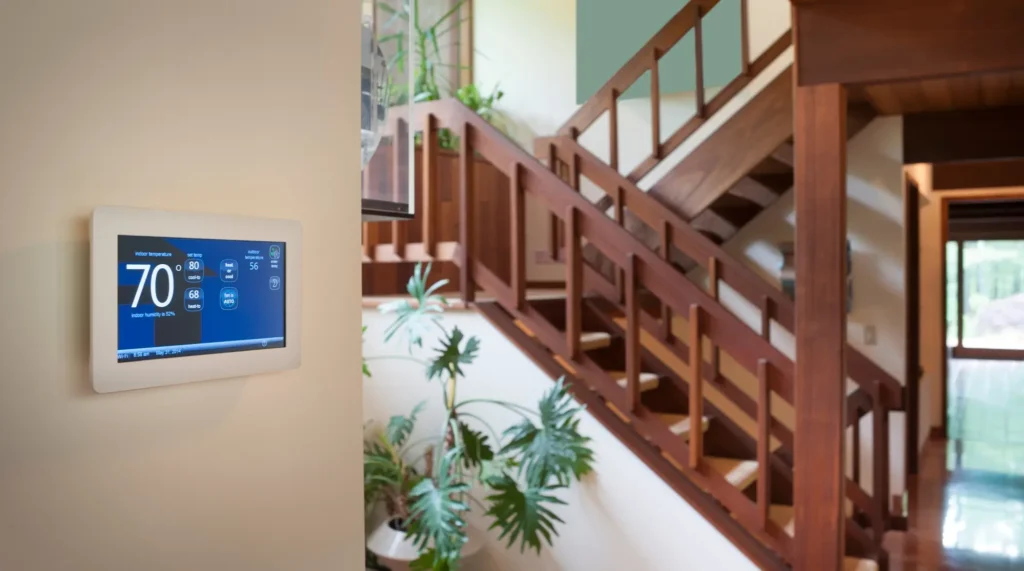Selecting the right boiler system for your home is more than a purchase—it’s an investment in your comfort and quality of life. A well-chosen boiler ensures a cozy living space and contributes to managing energy costs and reducing environmental impact. The market offers a variety of boiler systems, each with its own set of features, fuel types, and methods of distributing heat. Understanding these differences and how they align with your household needs is paramount. This guide aims to navigate the intricate details of choosing a boiler, shedding light on the types of boilers available, their operational methods, fuel options, and the essential factors to consider before purchasing. Whether replacing an old system or installing a new one, making an informed decision will enhance comfort, efficiency, and long-term savings.
Table of Contents
Types of Boilers
Choosing the correct boiler begins with understanding the various types available, each designed to meet different needs and preferences. Here’s a breakdown of the primary boiler types, highlighting their unique features, advantages, and potential limitations.
Combi (Combination) Boilers
Features:
Provide heating and hot water from one unit, eliminating the need for a separate tank. They are compact and efficient, making them ideal for smaller homes or spaces where saving room is crucial.
Advantages:
Instant hot water on demand, eliminating the need to wait for a water cylinder to heat up. Typically, they are more energy efficient as they only heat water when needed, reducing waste.
Limitations:
Flow rate may be limited, meaning water pressure could decrease if multiple taps are used simultaneously. It is only sometimes suitable for homes with high hot water demand, such as multiple bathrooms.
System Boilers
Features:
Require a cylinder to store hot water but no separate tank for cold water, simplifying the system and installation process. Keep a steady supply of hot water ready for immediate use.
Advantages:
It can supply hot water to multiple taps without a pressure drop. They are often more efficient than conventional boilers since they don’t lose heat from a hot water tank.
Limitations:
Hot water is only sometimes available as with combi boilers; the system needs time to heat the water in the cylinder. The need for a hot water cylinder means they take up more space than combi boilers.
Conventional (Regular) Boilers
Features:
They require both a cold-water tank and a separate hot-water cylinder. They are often used in homes with an older radiator system that might need to cope better with the high-water pressure delivered by the system or combi boilers.
Advantages:
It is ideal for homes with multiple bathrooms as it can provide a large amount of hot water to several taps at once. It is also suitable for areas with low water pressure or multiple water outlets used simultaneously.
Limitations:
Hot water can run out and needs time to reheat, unlike combi boilers that provide hot water on demand. Requires more space due to the need for a cold-water tank and a hot-water cylinder, typically in the loft. By carefully considering your home’s size, hot water needs, and available space, you can choose the type of boiler that best aligns with your living situation. Each type offers a unique balance of convenience, efficiency, and space requirements, making it crucial to assess your specific needs before deciding.
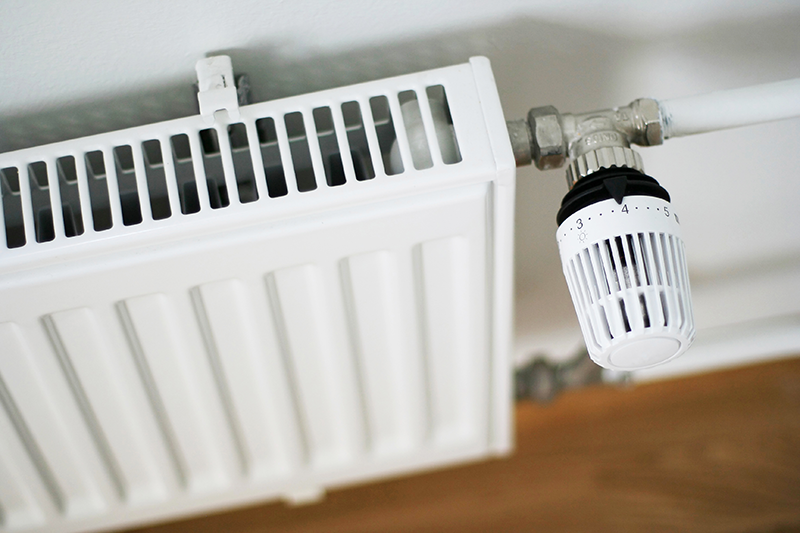
How the Heat Is Distributed
The method a boiler uses to distribute heat throughout your home significantly affects its efficiency, comfort, and overall heating costs. Understanding the different heating distribution systems can help you choose a boiler that aligns with your home’s infrastructure and personal preferences.
Radiator-Based Systems
Characteristics:
- The traditional method is where hot water circulates through a network of pipes to radiators.
- Radiators release heat into rooms, gradually warming the space.
Advantages:
- Proven reliability and can be controlled room by room.
- Compatible with most conventional and system boilers.
Considerations:
- Radiators must be appropriately sized and positioned for optimal heat distribution.
- Aesthetic impact, as radiators take up wall space.
Underfloor Heating
Characteristics:
- Hot water flows through pipes under the floor, heating the space from the ground up.
- It evenly distributes heat, eliminating cold spots.
Advantages:
- Provides a comfortable, consistent temperature.
- Frees up wall space, offering more flexibility in interior design.
Considerations:
- Higher initial installation cost.
- Best installed during construction or major renovations.
Air Heating Systems
Characteristics:
- Hot water from the boiler heats air that is then distributed via ductwork.
- Often combined with ventilation and air conditioning systems.
Advantages:
- Quick response time in heating the space.
- It can be an all-in-one heating, cooling, and air-filtering solution.
Considerations:
- Requires a network of ducts, which can be costly if not already in place.
- Regular maintenance of filters and ducts is necessary for efficiency and air quality.
The choice of heat distribution method affects not only the daily comfort but also the installation and long-term running costs of your home heating system. Consider the compatibility of your chosen boiler with the preferred distribution system and assess the impact on your home’s layout and lifestyle. Consulting with a heating professional can provide valuable insights into the most suitable option for your specific needs.
Types of Fuel Options
The fuel types your boiler uses is a critical decision that affects operating costs, installation complexity, and environmental impact. Different fuel types offer various benefits and challenges, and the availability in your area also influences your choice.
Gas Boilers
Characteristics:
- Common and widely used, it is often considered the standard for home heating.
- Requires a connection to the gas mains.
Advantages:
- Generally cheaper to run compared to electric boilers.
- Modern condensing gas boilers offer high energy efficiency and are efficient and practical.
Considerations:
- Not all locations have access to a gas network.
- Regular maintenance and safety checks are essential due to the risks of gas leaks.
Oil Boilers
Characteristics:
- An option for homes not connected to the gas network.
- Requires a tank for oil storage on your property.
Advantages:
- It can be a cost-effective solution, especially in areas where oil prices are competitive.
- Modern oil boilers are efficient and can be a reliable heat source.
Considerations:
- Fluctuating oil prices can affect running costs.
- Requires space for an oil tank, and regular deliveries must be scheduled.
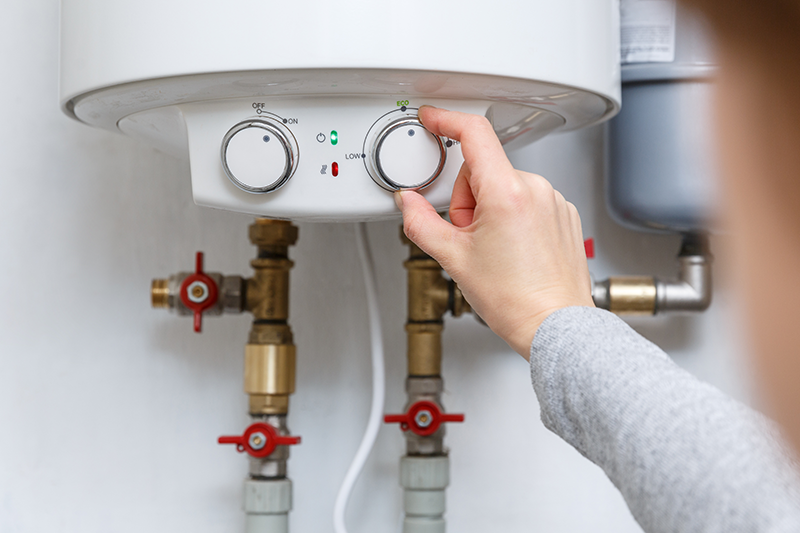
Electric Boilers
Characteristics:
- Use electricity to heat water, suitable for properties without gas or oil access.
- It is typically compact and can be placed almost anywhere in the home.
Advantages:
- Simple installation and minimal maintenance.
- There is no risk of gas or oil leaks, which is often considered safer.
Considerations:
- Generally, running is more expensive due to higher electricity prices.
- It can be less efficient regarding energy usage than gas or oil options.
Biomass Boilers
Characteristics:
- Burns organic materials, like wood pellets, chips, or logs, to produce heat.
- Requires space for the boiler and a storage area for the fuel.
Advantages:
- It is considered carbon-neutral, as the CO2 released during burning is offset by the CO2 absorbed by the plants during their growth.
- It can be cost-effective, especially where biomass fuels are readily available.
Considerations:
- More space and manual intervention are required to feed the boiler.
- Initial installation costs can be high, and the system must comply with local regulations regarding emissions.
Selecting the correct fuel type involves balancing your home’s infrastructure, budget constraints, and environmental concerns. It’s also crucial to consider the long-term availability and cost of the fuel, as well as any potential changes in energy policy that could affect your choice. Consulting with a heating expert can help you navigate these considerations and choose the most suitable and sustainable option for your home.
How to Choose a Good Boiler
Choosing the correct boiler goes beyond the type and fuel; it ensures reliability, longevity, and optimal performance. Here are vital factors to consider when selecting a boiler to ensure it meets your home’s heating needs and your expectations for efficiency and durability.
Reliability
- Opt for brands with a reputation for reliability and longevity.
- Check consumer reviews and professional feedback about the model’s performance over time.
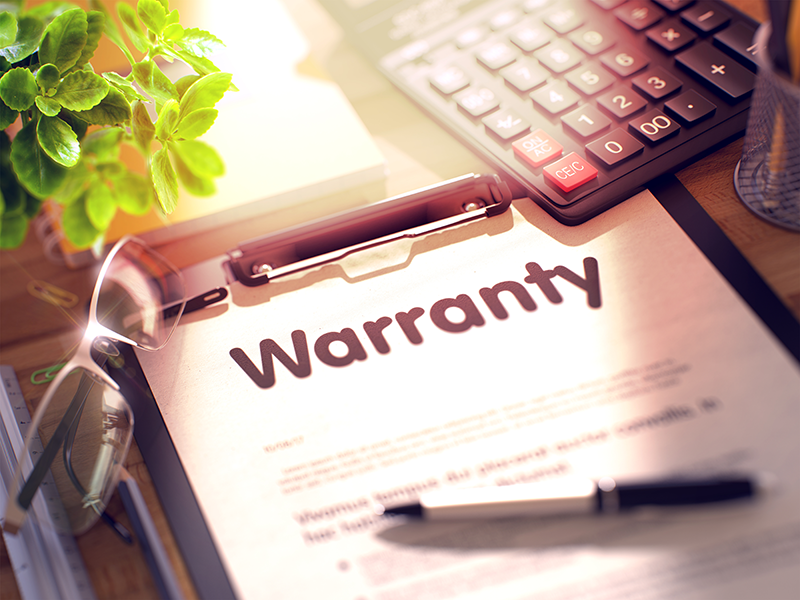
Warranty and After-Sales Service
- Look for boilers with a comprehensive warranty covering parts and labor for an extended period.
- Consider manufacturers that offer prompt and supportive after-sales service, ensuring you can get assistance when needed.
Brand Reputation and Certifications
- Choose brands known for quality and adherence to industry standards.
- Ensure the boiler meets local and international standards and certifications for safety and efficiency.
Energy Efficiency
- Select a boiler with a high-efficiency rating. Condensing boilers, for instance, are designed to capture and reuse heat that would otherwise escape, making them more energy efficient.
- A boiler with a high Annual Fuel Utilization Efficiency (AFUE) rating will convert more fuel into usable heat, reducing waste and operating costs.
Size and Output
Ensure the boiler’s output matches your home’s heating and hot water demands. An oversized or undersized boiler can lead to inefficiency and increased costs. Consult with a heating professional to properly calculate your home’s heat loss.
Compatibility with Existing Systems
If you need to replace the entire heating system, ensure the new boiler is compatible with your current radiators, pipes, and controls. Consider if your home’s infrastructure can support the new boiler’s requirements, such as venting for gas boilers or storing biomass fuels.
Futureproofing
Think about the long-term implications of your choice. Is the boiler technology likely to remain supported and efficient in the coming years? Consider how potential changes in energy policies or fuel prices might affect your boiler choice.
Selecting the right boiler is a balance between immediate needs and long-term considerations. By focusing on reliability, efficiency, and compatibility with your home and lifestyle, you can choose a boiler that offers comfort, efficiency, and peace of mind for years to come. Consulting with a heating professional can provide personalized advice tailored to your circumstances.
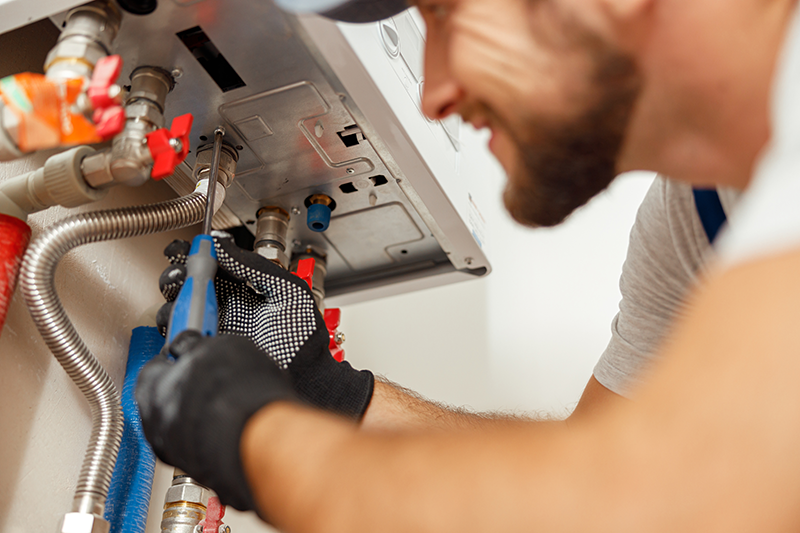
Recommendations from Plumbers
Gathering insights from industry professionals can significantly inform your decision when purchasing a new boiler. Plumbers and heating engineers, with their extensive experience in installation and maintenance, often have valuable recommendations regarding boiler choice. Here’s a summary of common advice from these experts:
Emphasis on Quality and Brand Reputation
Professionals often recommend well-established brands known for quality and reliability. They suggest choosing manufacturers with strong after-sales support and accessible spare parts.
Importance of Proper Installation
Even the best boilers can underperform if not installed correctly. Experts stress the importance of having your boiler installed by a certified professional familiar with local regulations and manufacturer specifications.
Sizing Matters
Plumbers frequently advise against oversizing your boiler, as it can lead to inefficiency and increased wear. A properly sized boiler, as determined by a heat loss calculation, will operate more efficiently and last longer.
Consideration for Future Maintenance
Easy access to parts and straightforward maintenance can simplify the upkeep of your boiler. Professionals often recommend brands and models with a track record of easy maintenance and longevity.
Energy Efficiency as a Priority
Energy-efficient models are better for the environment and cost-effective in the long run. Plumbers often endorse high-efficiency boilers that significantly save energy bills over time.
Integration with Existing Systems
Compatibility with your current heating system, such as radiators and piping, is crucial. Plumbers can provide insights into which boilers work best with your home’s infrastructure.
Taking advice from experienced professionals can guide you toward a boiler that meets your specific needs, ensuring a smooth installation process and reliable performance. It’s always recommended to consult with a certified plumber or heating engineer who can offer tailored advice and ensure that your boiler choice is a perfect fit for your home.
Determining the Right Size: How Many BTU Boilers Do I Need?
Selecting the correct size for your boiler is paramount to ensure the system’s efficiency, comfort, and longevity. A boiler that’s too small won’t adequately heat your home, while one that’s too large will incur unnecessary energy costs. British Thermal Units (BTU) is the measure used to determine the power of heating and cooling systems, indicating the amount of heat required to raise the temperature of one pound of water by one degree Fahrenheit. Here’s how to determine the right BTU for your boiler:
Understanding BTU Requirements
The required BTU output for your boiler depends on your home’s size, climate, insulation quality, and heating needs. A rough estimate is approximately 50 BTU per square foot for a moderate climate. However, this can vary significantly based on specific conditions.
Conducting a Heat Loss Calculation
A professional heat loss calculation is the most accurate way to determine the correct BTU for your boiler. This calculation considers window sizes, wall materials, insulation quality, and local climate.
Considering Room Usage and Layout
Rooms with high ceilings, large windows, or frequent drafts may require additional heating. The layout of your home and the heat distribution also play a role in determining the right boiler size.
Planning for Future Changes
Consider future home improvements such as added insulation, new windows, or extensions, which can alter your heating requirements. A boiler slightly larger than your current needs can accommodate small changes without being excessively oversized.
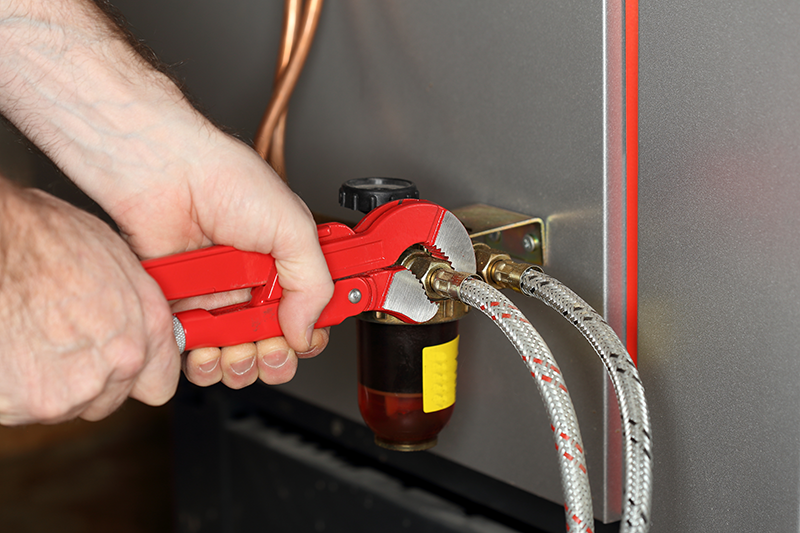
Seeking Professional Advice
Due to the complexities involved in sizing a boiler, consulting with a heating professional is highly recommended. A professional can provide a comprehensive assessment and ensure that your boiler meets your current needs and is efficient and cost-effective in the long run.
Choosing the right BTU for your boiler is not a decision to be taken lightly. An accurate assessment considering all relevant factors ensures your boiler operates efficiently, providing comfortable and consistent heat while keeping energy costs in check.
What to Consider Before You Buy
Before finalizing your boiler purchase, it’s crucial to consider all aspects of the investment. A new boiler represents a significant commitment, not only in terms of initial costs but also regarding long-term comfort and operating expenses. Here are key considerations to ensure you make a well-rounded decision:
Energy Efficiency
- Opting for a high-efficiency boiler can substantially save energy bills over time.
- Look for boilers with a high Annual Fuel Utilization Efficiency (AFUE) rating or equivalent certification.
Cost vs. Savings
While higher-efficiency boilers may have a greater upfront cost, they can offer significant savings in the long term through reduced fuel consumption.
- Consider the potential savings in energy costs when evaluating the price of a boiler.
- Compatibility with Your Home.
- Ensure the chosen boiler is compatible with your existing heating distribution system unless you plan a complete overhaul.
- Assess whether your home’s infrastructure supports your choice, such as venting for gas boilers or electricity supply for electric boilers.
Installation and Operating Space
- Account for the space needed for the boiler and any additional equipment like tanks or cylinders.
- Consider the boiler’s location for optimal operation and ease of maintenance.
- Local Regulations and Incentives
- Be aware of local building codes and environmental regulations that might affect your boiler or fuel type choice.
- Explore any government incentives or rebates for installing energy-efficient systems.
Futureproofing
Consider the longevity of the technology and how future changes in energy policies or fuel prices might impact your choice. Choose a boiler that can adapt to potential upgrades in your home, like smart thermostats or renewable energy sources.
A comprehensive assessment before purchasing a boiler ensures that your choice aligns with your home’s needs, lifestyle, and financial plan. It’s an investment in your comfort and your home’s value, so consider these factors carefully and seek professional advice to make an informed decision that you’ll be satisfied with for years to come.
Conclusion
Choosing the right boiler for your home is a decision that requires careful consideration and thoughtful analysis. It’s about balancing your household’s immediate needs with your choice’s long-term implications. By understanding the types of boilers, the methods of heat distribution, fuel options, and the factors contributing to a boiler’s efficiency and compatibility with your home, you are well-equipped to make an informed decision.
Remember, a boiler is not just a source of heat; it’s a core component of your home’s comfort and energy efficiency. The right boiler will provide reliable warmth, contribute to a more sustainable lifestyle, and significantly save energy bills. Moreover, it’s a decision that benefits from the insights of industry professionals, from the initial selection process to installation and maintenance.
In your journey to select the perfect boiler, consider the boiler’s type, size, fuel type, and efficiency. Weigh these against your home’s needs, budget, and environmental considerations. And finally, ensure that your choice is future-proof, aligning with potential changes in energy policies or your circumstances.
Investing time now in understanding your options and consulting with professionals will pay dividends in comfort, peace of mind, and financial savings for many years. Your new boiler is not just an addition to your home; it’s a commitment to a warm, efficient, and sustainable future.
HOP Energy can Help With Different Types of Home Heating
HOP Energy is your trusted partner for all your home heating needs. With our expertise in various heating systems, we offer installation, maintenance, and repair services to ensure your home stays warm and comfortable. Proper installation and maintenance are key to extending the lifespan of your heating system and maintaining its efficiency. We are committed to providing top-notch service to meet these needs.
